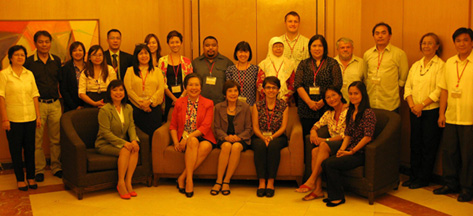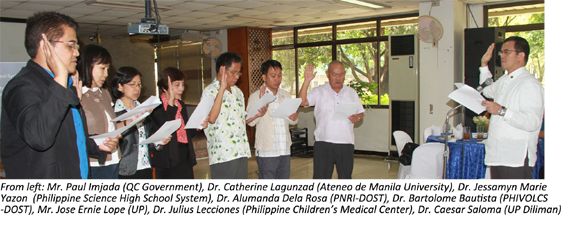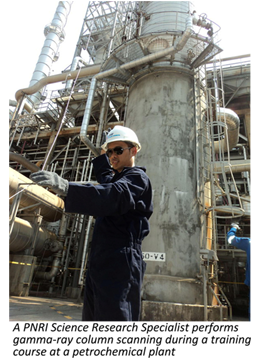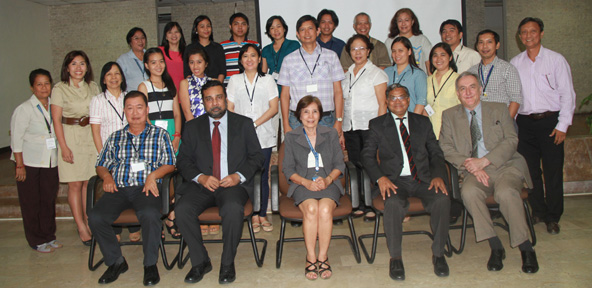Regional Meeting on Receptor Binding Assay to Address Red Tide
- Details

Doing its part to help reduce the impact of Harmful Algal Blooms (HAB) or red tide throughout the Asia-Pacific region, the Philippine Nuclear Research Institute – Department of Science and Technology (PNRI–DOST) hosted the first coordination meeting of the International Atomic Energy Agency (IAEA) RAS7026 Project, “Supporting the Use of Receptor Binding Assay (RBA) to Reduce the Adverse Impacts of Harmful Algal Toxins on Seafood Safety” at Eastwood Richmonde Hotel in Quezon City from June 23 to 27.
The meeting was attended by 17 participants from Indonesia, Malaysia, the Philippines, Thailand and the Marshall Islands with experts from Institut Louis Malarde (ILM), French Polynesia; Cawthron Institute, New Zealand; and the Intergovernmental Oceanographic Commission of the United Nations Educational, Scientific and Cultural Organization (IOC–UNESCO), Denmark. The IAEA which organized the meeting was represented by Dr. Jane Gerardo Abaya, Section Head for the Technical Cooperation Department in Asia and the Pacific and Programme Management Officer, and Ms. Marie Yasmine Bottein, IAEA Technical Officer. Local participants included scientists, researchers and regulators from the University of the Philippines–Marine Science Institute (UP–MSI), the Bureau of Fisheries and Aquatic Resources (BFAR) and PNRI.
Read more: Regional Meeting on Receptor Binding Assay to Address Red Tide
PNRI Hosts 2014 General Election of Quezon City Science Community
- Details
 As the secretariat of the Quezon City Science Community Foundation Incorporated (QCSCFI), the Philippine Nuclear Research Institute – Department of Science and Technology (PNRI–DOST) hosted the 2014 General Elections of its Board of Trustees on June 27 at the PNRI compound.
As the secretariat of the Quezon City Science Community Foundation Incorporated (QCSCFI), the Philippine Nuclear Research Institute – Department of Science and Technology (PNRI–DOST) hosted the 2014 General Elections of its Board of Trustees on June 27 at the PNRI compound.
Founded in 1993, the QCSCFI is an organization of scientific, technological, academic and administrative institutions in Quezon City for the purpose of undertaking science and technology ventures to address the needs of the city as well as the country. The QCSCFI currently has 38 members, including DOST and other government agencies, educational institutions from both secondary and tertiary levels, research institutions, media networks, hospitals and the Quezon City Government.
Former University of the Philippines Diliman Chancellor Dr. Caesar Saloma (extreme right) administered the oathtaking of the newly elected agencies for the Board of Trustees and Sector Representatives: Ateneo de Manila University for President, QC Government for Vice President, Philippine Science High School System for Secretary and Science Education and Awareness Sector Representative, PNRI for Treasurer, Philippine Institute for Volcanology and Seismology (PHIVOLCS) for Environmental Enhancement and Protection Sector Representative and Philippine Children’s Medical Center for Health and Medicine Sector Representative.
Gamma Ray Column Scanning Technique For Industries (old)
- Details
 The Philippine Nuclear Research Institute - Department of Science and Technology (PNRI-DOST) is now offering its service to assist the industry in the inspection and investigation of process vessels using the Gamma Ray Column Scanning Technology. This technology makes it possible to “see” inside a process vessel (e.g. distillation columns in refineries or petrochemical industries) and quickly identify its problems without interrupting normal plant operations.
The Philippine Nuclear Research Institute - Department of Science and Technology (PNRI-DOST) is now offering its service to assist the industry in the inspection and investigation of process vessels using the Gamma Ray Column Scanning Technology. This technology makes it possible to “see” inside a process vessel (e.g. distillation columns in refineries or petrochemical industries) and quickly identify its problems without interrupting normal plant operations.
Process columns are critical components in industries where separation of components to extract or refine raw materials is undertaken such as the case in petroleum products and fertilizer manufacturing plants. Malfunctioning of components or erroneous parameter settings would cause inefficiency in processes that could lead to waste of materials or loss of resources or even worse, to emergency total shutdown of operation. These in turn would mean significant financial loss to the industry and, depending on the nature of the product, could affect the economy.
Gamma Ray Column Scanning Technology or simply Column Scanning uses a gamma-ray emitting radioactive source, either a Co-60 or Cs-137, and detector strategically positioned to scan a process vessel or column to acquire its density profile even when the process is on-going. This density profile could provide significant information on the condition of the whole process and vessel such as damaged or missing trays and their positions, extent of flooding and its location, liquid weeping and foaming, liquid levels, and blockages, among others.
From this information, the engineers and operators can derive conclusions on the status of the column and consequently make arrangements for maintenance and troubleshooting to prevent emergency shutdown.
Advantages
- Because gamma-ray column scanning provides real-time information and uses a sealed radioactive material that is not affected by environmental conditions, it provides advantages in troubleshooting procedures.
- Moreover, it is non-destructive and cost efficient as there is no need for column preparation, removal of insulations and shutdown of operation during investigation thereby reducing production downtime.
- It also does not emit or produce any waste to the environment making it safe to use.
The advantages and benefits of gamma column scanning make it a favored procedure that is routinely used by competent industries in other countries to inspect and ensure the integrity and condition of their processes and vessels.
For more information on gamma column scanning, please contact Section Head Ms. Adelina M. Bulos, Head - Isotope Techniques Section, PNRI in Commonwealth Avenue, Diliman, Quezon City or call us at 929-6011 local 225 or 240. You can also send your queries at This email address is being protected from spambots. You need JavaScript enabled to view it.
PNRI Hosts IAEA Mission and National Workshop on Uranium Extraction from Phosphates
- Details

With more opportunities to access the country’s natural resources and minerals, the Philippine Nuclear Research Institute – Department of Science and Technology (PNRI-DOST) hosted an expert mission and national workshop of the International Atomic Energy Agency (IAEA) on uranium extraction from phosphates.
Uranium, which is commonly used as fuel for nuclear power plants, may also be extracted from alternative sources such as phosphate rocks and phosphoric acid.
Under the IAEA Technical Cooperation Project PHI2010 on “Enhancing National Capacity for Extraction of Uranium, Rare Earth Elements and Other Useful Commodities from Phosphoric Acid,” the PNRI aims not only to improve its capacity in rendering services on the processing of uranium and other valuable commodities such as rare earth elements for potential economic gain but also to help lessen the impact on the agricultural soil of continuous use of phosphate fertilizer having radioactive materials.
Experts from the IAEA visited PNRI from May 19 to 23 to help assess the project’s progress and to conduct a two-day national workshop on “Situation Assessment for Uranium Extraction from Phosphate for Commercial Industries” which tackled on the various aspects of the extraction process, its place in the overall uranium production cycle, and potential opportunities for the industries involved.
PNRI’s Nuclear Materials Research Section has previously conducted preliminary studies on the potential of uranium extraction from phosphates obtained from the Philippine Phosphate Fertilizer Corporation (PHILPHOS) in Isabel, Leyte.
Representatives from PHILPHOS, the Department of Science and Technology – Philippine Council for Industry, Energy and Emerging Technology Research and Development (DOST-PCIEERD), the Department of Environment and Natural Resources – Environment Management Bureau (DENR-EMB) and the Coal and Nuclear Minerals Division of the Department of Energy – Energy Resource Development Bureau (DOE-ERDB) as well as scientists and researchers from PNRI participated in the workshop.












































